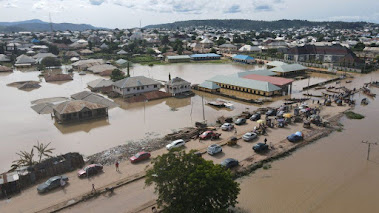Thoughts on flooding in Nigeria
Perennially challenges
I've just written a blog on the damage that drought can have to an economy and local community. 1.4 million people have now been displaced by the opposite. Flooding is a perennial challenge in Nigeria and this will continue in a changing climate. The climate and low relief geography in this region does tend to favour flooding and floodplains but I read something very interesting in the Conversation about the potential causes being multi-functional damming and poor management.
Multifaceted and mismanaged
In a perfect world, a dam should have an agreed purpose. Flood control, hydro-electricity generation, navigational channels, fisheries... There are many uses for dams but trying to fit too many of these functions into one location can result in problems. For example, a dam built upstream from a wetlands can cause wetlands downstream to dry out. This can reduce the amount of water available to the people in the downstream region (and many other issues relating to food security and biodiversity habitat loss!). Additionally, allowing a dam to fill to a maximum can result in huge scale flooding if precipitation rates go up and the dam overflows, whereas little energy can be produced when the dam is pretty much empty for flood control. Most dams are being used multi functionally for fisheries, flood control and power generation and poor management is resulting in non of these purposes being fulfil to its potential.
There is an issue of poor or no urban planning. Coming back to Kenya, one of the largest informal settles in Nairobi is Kibera. Rapid urbanisation in this area has forced populations to lived in high risk flood areas. Displacement during this large flood events is intrinsically linked to the poor urban management of cities.
Is there a solution?
Creating a singular commission to oversee these industries could allow countries Nigeria to maintain both control over their hydrological cycle and potentially reduce the impacts of the flooding but would have to operate in an unbiased way. This does raise some questions like whether one state be happy to be the flood control dam when they are seeing their neighbours create massive profits from power generation
Read Nigeria floods: government's mismanagement of dams is a major cause by Olayinka Olatokunbo Ogunkoya



Hi Tim,
ReplyDeleteI'm really enjoying your blog, it's a very interesting take on the topic! I know we have a lecture on the Nigerian floodplains coming up, which might be a good chance for expansion on this topic, but I am intrigued by this idea of amalgamating government bodies to solve mismanagement issues. Is this solution successful in other places that have attempted this, especially with larger catchments, like the cross-boundary Nile Initiative? Do you think a singular organisation would struggle to consult locals, especially given the rural context of some of the flooded locations? What about the issue of political discontinuity brought up in the article, do you feel that interstate cooperation would improve or expand these issues? Apologies for all the questions, this was a great introduction into a very interesting topic!
Hi Aarushi. Thank you for your comment.
DeleteI cannot find any resources showing examples of amalgamations of governmental and infrastructural bodies. I did find several articles suggesting that Nigeria's regional environmental agencies were severely lacking in their public engagement of flood awareness and overall assessment of flood risks and vulnerability.
Combined with this, physical planning and urban development agencies were not monitoring the development of urban areas leaving these areas further at risk. Citizens themselves b Nigeria’s burgeoning population is resulting in housing developments being created on flood plains. The planning and environmental agencies need some integration to prevent this from continuing.
Since at least 2017 there has been debate about taking Nigeria’s water management organisations from state to federal control. There was a controversial bill proposed in 2020 that would remove that power. Nigeria has hugely diverse landscape and this landscape impacts people’s opinions on water management.
In my post, I was referring to a singular commission as an overseeing body as opposed to a corporation in total control. This commission would focus on allowing federal agencies, state agencies, non-governmental agencies, community-based organistations and residents to collaborate, enhancing community participation and strengthening social cohesion.
The singular commission that I was referring has been suggested by Olasunkanmi Habeeb Okunola in this article: https://theconversation.com/what-nigerian-cities-can-do-to-cope-better-with-flood-risk-172312.
Hope this somewhat answers some of your questions and provides a bit more information that was perhaps missed in the initial post!
Tim
Hi Tim, love this post summarising the situation in Nigeria, the mismanagement of dams appears to be a common theme amongst flooding issues. Do you believe that the mismanagement in this case is ignorance or an attempt to maximise dam uses for economic gain? A similar issue to one I have come across in groundwater where the over extraction out of low recharging aquifer groundwater reserves in countries such as Libya is common practise with an aim of economically developing.
ReplyDelete